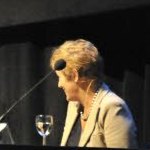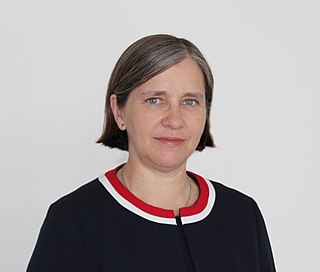Econophysics is a non-orthodox interdisciplinary research field, applying theories and methods originally developed by physicists in order to solve problems in economics, usually those including uncertainty or stochastic processes and nonlinear dynamics. Some of its application to the study of financial markets has also been termed statistical finance referring to its roots in statistical physics. Econophysics is closely related to social physics.

Evacuation simulation is a method to determine evacuation times for areas, buildings, or vessels. It is based on the simulation of crowd dynamics and pedestrian motion. The number of evacuation software have been increased dramatically in the last 25 years. A similar trend has been observed in term of the number of scientific papers published on this subject. One of the latest survey indicate the existence of over 70 pedestrian evacuation models. Today there are two conferences dedicated to this subject: "Pedestrian Evacuation Dynamics" and "Human Behavior in Fire".

The Associateship of King's College (AKC) award was the degree-equivalent qualification of King's College London from 1833. It is the original qualification that King's awarded to its students. In current practice, it is an optional award, unique to King's College London, that students can study in addition to their degree proper. After successfully completing the AKC course, participants may apply to be elected by the Academic Board of King's College London as an 'Associate of King's College' (AKC). Once their election has been ratified, they are permitted to use the post-nominal letters "AKC" along with their main qualification.
Statistical finance is the application of econophysics to financial markets. Instead of the normative roots of finance, it uses a positivist framework. It includes exemplars from statistical physics with an emphasis on emergent or collective properties of financial markets. Empirically observed stylized facts are the starting point for this approach to understanding financial markets.

Denise Anne Lievesley is a British social statistician. She has formerly been Chief Executive of the English Information Centre for Health and Social Care, Director of Statistics at UNESCO, in which capacity she founded the UNESCO Institute for Statistics, and Director (1991–1997) of what is now the UK Data Archive.
Quantum finance is an interdisciplinary research field, applying theories and methods developed by quantum physicists and economists in order to solve problems in finance. It is a branch of econophysics. Today several financial applications like fraud detection, portfolio optimization, product recommendation and stock price prediction are being explored using quantum computing.
A stock correlation network is a type of financial network based on stock price correlation used for observing, analyzing and predicting the stock market dynamics.
Réka Albert is a Romanian-Hungarian scientist. She is a distinguished professor of physics and adjunct professor of biology at Pennsylvania State University and is noted for the Barabási–Albert model and research into scale-free networks and Boolean modeling of biological systems.
Physics of financial markets is a non-orthodox economics discipline that studies financial markets as physical systems. It seeks to understand the nature of financial processes and phenomena by employing the scientific method and avoiding beliefs, unverifiable assumptions and immeasurable notions, not uncommon to economic disciplines.

Annalisa Pastore is a Professor of Chemistry and Molecular Biology at King's College London. In 2018 she was appointed full professor at the Scuola Normale Superiore di Pisa. In 2022, she was appointed director of research for life sciences, chemistry and soft matter science at European Synchrotron Radiation Facility. She resigned in Frebruary 2023.
Tara Keck is an American-British neuroscientist and Professor of Neuroscience and Wellcome Trust Senior Research Fellow, at University College London working in the Department of Neuroscience, Physiology, and Pharmacology. She is the Vice-Dean International for the Faculty of Life Sciences. She studies experience-dependent synaptic plasticity, its effect on behaviour and how it changes during ageing and age-related diseases. She has worked in collaboration with the United Nations Population Fund on approaches for healthy ageing. Her recent work has focused on loneliness in older people, with a focus on gender. She was named a UNFPA Generations and Gender Fellow in 2022.

King's Business School (KBS) is the business school of King's College London located in London, the United Kingdom and is a constituent academic faculty of the university. KBS is triple accredited by the AACSB, EQUIS, and AMBA.
Sanjukta Deb is a British professor of biomaterials science at the Centre for Oral, Clinical & Translational Sciences at King's College London (KCL), United Kingdom. She joined KCL in 1996.
The Suffrage Science award is a prize for women in science, engineering and computing founded in 2011, on the 100th anniversary of International Women's Day by the MRC London Institute of Medical Sciences (LMS). There are three categories of award:
- life sciences
- engineering and physical sciences
- mathematics and computing.

Giorgio Kaniadakis a Greek-Italian physicist, is a Full Professor of Theoretical Physics at Politecnico di Torino, Italy, and is credited with introducing the concept of Kaniadakis entropy and what is known as Kaniadakis statistics.

Lucy Chappell is a British professor of obstetrics at King’s College London and the Chief Scientific Adviser (CSA) for the UK Department of Health and Social Care. As part of her CSA role, she oversees the National Institute for Health and Care Research (NIHR) as Chief Executive Officer. Her research areas include medical problems during pregnancy such as pre-eclampsia, and the safety of medicines in pregnancy.
Katie Bentley is a British computer scientist who is group leader in the Cellular Adaptive Behaviour Laboratory at the Francis Crick Institute and an academic at King's College London. Her research considers computational simulations of cellular interactions.
Maddy Parsons is a British cell biologist who is a professor and Associate Dean for Impact & Innovation at King's College London. She is the Director of the Nikon Imaging Centre. Her research looks to understand the fundamental mechanisms that underpin cell adhesion and migration. She is Chair of the Medical Research Council Molecular & Cellular Medicine Board.
Jing Chi is a New Zealand finance academic, and is a full professor at Massey University, specialising in Initial Public Offerings, Chinese corporate finance and Chinese corporate governance. She is a Chartered Financial Analyst and won a national award for her teaching.

Anirban Chakraborti is an Indian physicist and professor of econophysics at the School of Computational and Integrative Sciences at Jawaharlal Nehru University in New Delhi. Anirban Chakraborti has published work mainly in the fields of econophysics and data science.







